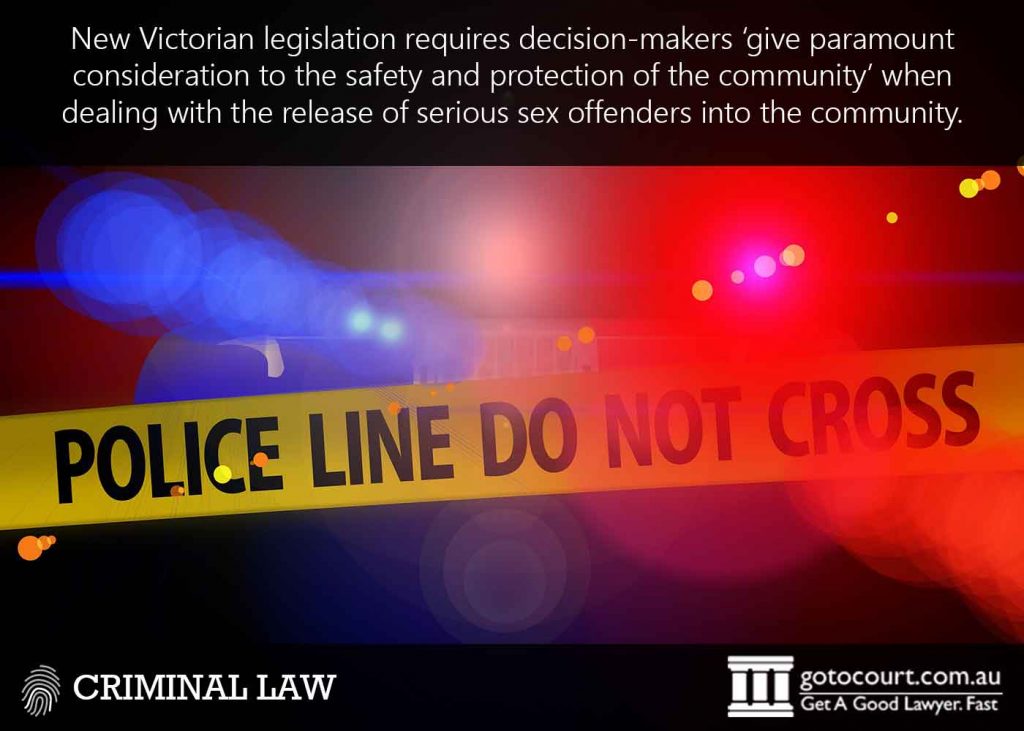Call our lawyers
now
or,
have our lawyers
call you
Stronger Supervision of Serious Sex Offenders in Victoria
Stronger Supervision of Serious Sex Offenders in Victoria
[vc_row][vc_column][vc_column_text] On 1 June 2016, new legislation came into effect in Victoria which is designed to ‘protect the community further from sexual offenders including those serious sex offenders who may be, or may become, violent’.
On 1 June 2016, new legislation came into effect in Victoria which is designed to ‘protect the community further from sexual offenders including those serious sex offenders who may be, or may become, violent’.
The Serious Sex Offenders (Detention and Supervision) Amendment (Community Safety) Act 2016 (‘the amending Act’) alters a number of existing pieces of legislation, but that which is most affected is the Serious Sex Offenders (Detention and Supervision) Act 2009 (‘the principal Act’).[/vc_column_text][/vc_column][/vc_row][vc_row][vc_column][vc_accordion][vc_accordion_tab title=”Background”][vc_column_text]The amending Act arose largely as a result of the actions of serial offender, Sean Christian Price, in Melbourne in March 2015. Price had an extensive criminal history which included assaults against 7 women, the rape of a 13 year old girl, and the rape of another woman while she was at home with her two children. He had earlier been diagnosed with schizophrenia and psychosis, and had spent several years of a 5½ year sentence in a psychiatric prison hospital before being transferred into the general prison population. On 2 October 2014, he was released on bail under a serious sex offender supervision order which was to remain in place for a period of 10 years.
On 17 March, in Koonung Creek Linear Park, Price came upon 17 year old Masa Vukotic who was out for her regular evening walk less than 1 kilometre from her family home in Doncaster. Price grabbed Ms Vukotic and forced her into bushes where he produced a large knife with which he stabbed her 49 times. Two days later, he attacked a man who was unfortunate enough to enter a lift with him. The victim was put into a headlock, punched repeatedly in the face, and robbed. Later that same day, Price raped a woman at a Christian bookshop.
Price was convicted of Ms Vukotic’s murder and the unrelated rape in March 2016. In handing down the sentence, Supreme Court Justice Lex Lasry described Price’s conduct as ‘disgusting’ and acknowledged that his ‘immediate prospects for any form of rehabilitation [were] bleak at best, if not non-existent’. Although imposing a sentence of life imprisonment, Justice Lasry conceded that ‘principles of mercy’ meant that he could not impose the sentence without any prospect for parole, and so set a non-parole period of 38 years. He also imposed a sentence of 14 years imprisonment for the rape. (Price has also this year been convicted of and sentenced for threatening to kill a prison guard).
In sentencing Price, Justice Lasry also took aim at the Department of Corrections and the Adult Parole Board, accusing them of ‘catastrophic mismanagement’. He accused them of having ‘failed to protect the community from the danger [Price] clearly posed with tragic results’.
 [/vc_column_text][/vc_accordion_tab][vc_accordion_tab title=”Government response”][vc_column_text]In response to Price’s conduct and the subsequent public outcry, internal reviews were conducted by both the Department of Justice and Regulation and the Department of Health and Human Services in relation to their engagement with Price since his release into the community. In addition, the Victorian government engaged former judge of the Victorian Court of Appeal, David Harper, to undertake a review of the legislation governing the detention and supervision of serious sex offenders in Victoria. The report, ‘Complex Adult Victim Sex Offender Management Review Panel: Advice on the Legislative and Governance Models under the Serious Sex Offenders (Detention and Supervision) Act 2009 (Vic)’ (‘the Harper Review’), was released in November 2015 – prior to Price’s trial. The new legislation arising from the report was passed on 24 May 2016.[/vc_column_text][/vc_accordion_tab][vc_accordion_tab title=”Dates for commencement of the new legislation”][vc_column_text]The majority of the new legislation came into effect in Victoria on 1 June 2016. Part 3 which relates to police powers is not yet operational to allow time for police to increase resourcing to meet the new legislative requirements and for new regulations to be put in place. Unless it is possible to enact the Part sooner, it will commence on 1 March 2017.[/vc_column_text][/vc_accordion_tab][vc_accordion_tab title=”Primary effects of the new legislation”][vc_column_text]The effect of the new legislation is, in essence:
[/vc_column_text][/vc_accordion_tab][vc_accordion_tab title=”Government response”][vc_column_text]In response to Price’s conduct and the subsequent public outcry, internal reviews were conducted by both the Department of Justice and Regulation and the Department of Health and Human Services in relation to their engagement with Price since his release into the community. In addition, the Victorian government engaged former judge of the Victorian Court of Appeal, David Harper, to undertake a review of the legislation governing the detention and supervision of serious sex offenders in Victoria. The report, ‘Complex Adult Victim Sex Offender Management Review Panel: Advice on the Legislative and Governance Models under the Serious Sex Offenders (Detention and Supervision) Act 2009 (Vic)’ (‘the Harper Review’), was released in November 2015 – prior to Price’s trial. The new legislation arising from the report was passed on 24 May 2016.[/vc_column_text][/vc_accordion_tab][vc_accordion_tab title=”Dates for commencement of the new legislation”][vc_column_text]The majority of the new legislation came into effect in Victoria on 1 June 2016. Part 3 which relates to police powers is not yet operational to allow time for police to increase resourcing to meet the new legislative requirements and for new regulations to be put in place. Unless it is possible to enact the Part sooner, it will commence on 1 March 2017.[/vc_column_text][/vc_accordion_tab][vc_accordion_tab title=”Primary effects of the new legislation”][vc_column_text]The effect of the new legislation is, in essence:
- to compel decision-makers under the principal Act to ‘give paramount consideration to the safety and protection of the community’ (new s 6A),
- to strengthen requirements for Sex Offender Registration Orders and lengthen their duration,
- to add further core conditions, and provide additional options for non-core conditions for Sex Offender Registration Orders, and
- to expand the application of the principal Act from solely sexual offences to include offences of violence as well.
[/vc_column_text][/vc_accordion_tab][vc_accordion_tab title=”The detail of the new legislation”][vc_column_text]
Serious Sex Offenders (Detention and Supervision) Act
New s 6B requires that whenever a supervision or detention order is made, confirmed or renewed under the principal Act, or if, on the review of an order, the conditions are varied, added, removed or confirmed, a Sex Offender Registration Order must also be made for a period of at least 15 years (see s 11(9)-(10) of the Sex Offenders Registration Act 2004). It applies to orders made after 1 June 2016, as well as those in effect immediately prior to that date if they are later renewed, or the order, or a condition of the order, is reviewed (schedule 3 clause 2).
New core conditions have been added to supervision orders. While under a supervision order, offenders must not:
- commit an offence of violence in Victoria or anywhere else (s 16(2)(ab))
- threaten the safety of anyone including themselves (s 16(2)(ad)), or
- if in a residential facility, conduct themselves in a way that will risk the ‘good order’ of the facility, or the ‘safety and welfare’ of others present in the facility (s 16(2)(ac)).
New s 24A allows the court to apply restrictive conditions to a supervision order if there are reasonable grounds to think that they are ‘necessary to address the risk of harm (including sexual harm or violence or both) to the community’. This might include:
- prohibiting the consumption of alcohol
- prohibiting the obtaining or use of drugs
- prescribing where the offender is to live
- setting hours of curfew, and/or
- precluding contact with certain persons or a class of persons.
Any intentional or reckless breach of a term of a supervision order will now result in a period of imprisonment of at least 12 months unless a ‘special reason’ exists (s 10AB of the Sentencing Act 1991). Breaches which are considered serious now include conduct which ‘may increase the offender’s risk of committing a violent offence or engaging in violent conduct or is preparatory to a violence offence or that conduct’ (s 162(1)(ca)).
A list of those offences declared to be violent for the purposes of the principal Act is set out in the new schedule 1A. It includes obvious offences such as murder, manslaughter and assaults, but also goes so far as to include negligently causing serious injury, stalking, threats of property destruction or damage, bomb hoaxes, and contravention of family violence orders.
Changes not yet enacted
Part 3 which is yet to take effect expands police powers in relation to entry, search and seizure. For residential or corrections facilities, the person in charge of the facility will be able to order, or a police officer will be able to request or permit, a search when they reasonably suspect (as opposed to reasonably believe) the search is necessary (ss 142, 152). Police officers, or supervision or specified officers will be able, if necessary, to use reasonable force in carrying out a search (ss 142(7A), 152(4A)). Provisions relating to seizure of goods or possessions as a result of a search under s 142 or s 152 will been broadened to allow seizure in circumstances involving a potential breach of a supervision order or re-offending rather than re-offending alone (ss 143, 153).
Police powers to search in order to monitor compliance with supervision orders have been curbed in that the officer will only be able to conduct a search if they reasonably suspect it is necessary to assess compliance, or that the offender is at an increased risk of re-offending or of breaching the terms of the order (s 158DA(1)). The way in which they will be able to conduct the search will be detailed in s 158DA(2)-(7). Searches can include pat-downs and garment searches (ss 158DA(3), (8)). Powers to seize and examine seized items will be contained in s 158DB. The way in which the searches are to be conducted and how any seized goods are to be treated are set out in new ss 158G-158S.
Powers of entry and search in order to arrest an offender will be set out in s 171A(3)-(12), and the power to make regulations in s 198(2)-(3). It will be possible for police to detain an offender for 72 hours, up from 10 hours (s 168).
Corrections Act
A number of changes have also been made to the Corrections Act 1986 to allow better sharing of information relating to serious sex offenders in Victoria where there are reasonable grounds to believe that doing so is necessary to ‘reduce the risk of a person committing a violent offence’ or ‘lessen or prevent a threat to the life, health, safety or welfare of any person’ (s 104ZY(2)(a)). It also allows the disclosure of information to the Adult Parole Board if the person believes it is reasonably necessary (or believes on reasonable grounds that it is necessary) for one of the stated reasons, such as reducing the risk of the commission of a violent offence, or to ‘lessen or prevent a threat to the life, health, safety or welfare of any person’ (s 104ZZ).[/vc_column_text][/vc_accordion_tab][vc_accordion_tab title=”Critique of the new legislation”][vc_column_text]In short, as indicated earlier, the new legislation mandates that anyone making a decision under the principal Act in relation to serious sex offenders in Victoria ‘must give paramount consideration to the safety and protection of the community’.
This amendment effectively shifts the focus from the traditional position recognising the rights of the offender, to the rights of the general population. While this shift aligns more to the demands made by the public following Ms Vukotic’s murder, it does sit uneasily with well-established principles of justice upon which criminal law in all Australian states and territories is based.
These principles have historically dictated (in part) that a person can only be penalised by the state when they have been convicted of having committed a criminal offence, and only to the extent that is warranted in the circumstances. The changes to the Victorian legislation will, in effect, impose a penalty on an offender who has served the time the court considered an appropriate penalty for the offence for which they were convicted purely because they might, at some point in the future, commit another offence. This approach to criminal law has been frequently criticised as indefensible and unjust, as it runs contrary to basic principles of human rights.
It is, though, not the first example of criminal law legislation in Australia which has taken this approach. Back as far as 1990, the Victorian government passed a piece of legislation (Community Protection Act 1990) purely to enable the ongoing detention of a single serial sex offender, Garry David, beyond the terms of his prison sentence. The legislation was utilised a number of times to keep David behind bars, where he remained until he died just a couple of years later, aged 38 years, as a result of having swallowed a number of razor blades. When the legislation was passed, it drew very heavy criticism with some even claiming that it amounted to a form of ‘cruel and unusual punishment’.
In 1994, New South Wales passed a similar piece of legislation (Community Protection Act 1994) in order to indefinitely detain another serial sex offender, Gregory Wayne Kable, beyond the terms of his sentence. Unlike David, Kable protested the enactment of the legislation on the grounds that enabling the preventive detention of a particular person after the expiration of their sentence was unconstitutional. The full bench of the High Court agreed (Kable v Director of Public Prosecutions (NSW) (1996) 189 CLR 51) and the Act was overturned.
Then, in 2003, Queensland enacted its Dangerous Prisoners (Sexual Offenders) Act 2003. This Act, though drafted with a particular serial sex offender in mind (Robert John Fardon), took into account the views of the High Court in the Kable case and constructed the legislation so as to apply to a particular class of persons into which Fardon fell, rather than directing it at the individual. When challenged in the High Court (Fardon v A-G for the State of Qld [2004] HCA 46), the majority held that the Act in fact fell within the legislative ambit of the State, and could be validly applied where the risk of the person committing a further serious sexual offence is deemed ‘unacceptable’. However, in dissent, Justice Kirby, argued that the Act ‘ultimately deprives people … of personal liberty, a most fundamental right, on a prediction of dangerousness, based largely on the opinions of psychiatrists which can only be, at best, an educated or informed “guess”’. Both Western Australia (Dangerous Sexual Offenders Act 2006) and NSW (Crimes (High Risk Offenders) Act 2006) have since passed similar legislation.
While the new Victorian legislation doesn’t go quite so far as the preventive detention legislation, it does bare similarities in that it allows for the curbing of freedoms of an individual based on an assessment (‘an educated or informed “guess”’) of the risk of re-offending. It shifts focus away from the principles of justice and the determinable rights of the offender towards unquantifiable risks to public safety. The Harper Review justified this kind of approach, saying that, ‘while the principles [of justice] remain of central importance, the case for a strictly circumscribed regime of preventive detention or supervision is now accepted as a necessary element in the protective armoury which democratic constituents demand from their lawmakers’. Indeed, if challenged on the same basis as Kable or Fardon, it is likely to stand as, although it came about largely as a result of Price’s offending, it, like Queensland’s preventive detention Act, is drafted so as to apply to a class of offenders, not just Price. In addition, it might be distinguished from those cases in that it does not involve incarceration, but restricts activity in the community.
On a practical level, it is difficult to see what real difference the legislation will make. Decisions made under the Act, although made with community safety the prime concern, will still be subjective and based on ‘educated guesswork’. Those released on supervision orders will be subject to the order for longer, but if the orders are not already working as is necessary to prevent deaths such as that of Ms Vukovic, then extending the period over which it will apply seems a little futile. The orders can now be imposed against those who might commit offences of violence rather than only sexual offences, but this, too, requires guesswork. Perhaps the additional conditions will make the difference, but again, for people like Price, it is unlikely that any conditions would have prevented him from behaving as he did.
The extended police powers, once operational, may be the most effective part of the legislation. However, unless police are given a reason to believe there is a risk, they are powerless to act. It seems reasonable to assume that, had police known Price was going to act as he did, they would have tried to prevent it, even in the absence of the new powers.
Finding a balance between community concerns and the rights of an offender is never going to be easy. The subject is a polarising one, often complicated by the emotion of cases such as that of Ms Vukotic. Some have argued that serious sexual offenders have ‘forfeited’ their right to freedom, but the undermining of basic human rights should never be taken lightly. Arguably, this particular problem could be dealt with more effectively and with less impact on the principles of justice by simply setting higher sentences and higher non-parole periods for specific offences. While perhaps more expensive, it appears to avoid, or at least delay, the difficulties with subjective assessments (or ‘guesswork’) and the resource-intensive administrative requirements when releasing a person on a supervision order.
It will be interesting to see how the new legislation operates on a practical basis for serious sex offenders in Victoria and whether focussing on community safety when making supervision order decisions has any real effect.[/vc_column_text][/vc_accordion_tab][/vc_accordion][/vc_column][/vc_row][vc_row][vc_column][vc_column_text]This article reflects the state of the law as at 7 June 2016. It is intended to be of a general nature only and does not constitute legal advice. If you require legal assistance, please telephone 1300 636 846 or request a consultation at www.www.gotocourt.com.au.[/vc_column_text][/vc_column][/vc_row]

Affordable Lawyers
Our Go To Court Lawyers will assist you in all areas of law. We specialise in providing legal advice urgently – at the time when you need it most. If you need a lawyer right now, today, we can help you – no matter where you are in Australia.How It Works






1. You speak directly to a lawyer
When you call the Go To Court Legal Hotline, you will be connected directly to a lawyer, every time.

2. Get your legal situation assessed
We determine the best way forward in your legal matter, free of charge. If you want to go ahead and book a face-to-face appointment, we will connect you with a specialist in your local area.

3. We arrange everything as needed
If you want to go ahead and book a fact-to-face appointment, we will connect you with a specialist in your local area no matter where you are and even at very short notice.










